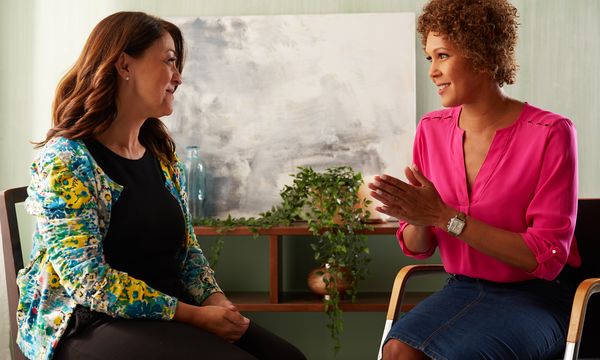
Life coaching can be "a game changer." At least it was for certified life coach Mara Heichman, who characterized her own experience as a life coach's client as such. Afra Williams, another life coach, is fond of saying that "everyone could benefit from a [life] coach."
So we asked them both, what does a life coach do, exactly? If you're looking to make a change, but want a little more information first, read on.
What is a life coach?
A good life coach is someone who will help a client understand what they want their life to look like, then determine how to get there. Life coaches are not just giving advice, and the relationship between client and life coach, says Mara, is "a partnership . . . to help the client discover their inner purpose and passions in order to achieve their outer goals and help them have sustainable results."
How is a life coach different than a psychotherapist?
If you're looking for someone to help you make sense of your past and how that is holding you back today, that's a role better filled by a therapist. If you're looking to the future, however, that's where a life coach might be the right support. Life coaching, says Afra, "is future-based. . . . It's a method for people to be accountable for taking the steps to create the life they want."
"I would say the most common reasons I see people is when they feel lost or stuck or low on purpose and confidence," says Mara. To that end, she often works with people to "increase self confidence, improve communication, navigate a life transition, and increase passion and zest for life."
What happens in life coaching sessions?
Think of the very first meeting as an ice breaker. Rather than get right to the coaching, your goal—and the coach's—should be to figure out whether the two of you are a good fit. Like any relationship, its success is the result of some intangible alchemy that can only be determined by communication.
Also, be prepared to honestly answer questions, as many as it takes. At first meetings, Mara asks clients to complete a 70-question assessment that helps her learn about the client and develop a baseline for future coaching sessions. Afra's questions are designed to "help the client notice [both] what might be missing and what's going well" in their lives.
Your life coach might ask you about what you perceive to be obstacles to your goals, and what you want to get out of these sessions, as well as harder-hitting questions. An example from Mara's assessment includes: "When people hurt you, how quickly do you forgive them?"
Depending on your need and goals, the number and frequency of sessions varies. Typical packages include 10–12 weekly hour-long sessions. As far as where the sessions will take place—some life coaches have their own offices, but these days many of them, including Mara and Afra, work by phone or video call.
How do I choose a life coach?
Most life coaches offer a free first-time consultation so both coach and client can determine whether they're compatible with each other—that all-important first meeting, as described above. "[Different] coaches," Mara says, "have different approaches."
While the coach will ask you questions, be sure to ask some of your own, such as "Do you have any specialties?" "What is your philosophy about life coaching?" "What types of people do you most enjoy working with?"
For example, Afra loves to work with creative people: "I work with them to make a masterpiece of their messes." Mara says, "My niche is teens, emerging adults, families and women and men in transition." Both of them especially enjoy working with clients who aren't fearful of the work it takes to make serious changes.
Most importantly, remember that change is work—difficult work. According to Mara, "Sometimes coaching is not fun—it requires the courage to be vulnerable and authentic. Some clients may need to go through therapy first and work on their back story before they can continue to move forward."
How important are life coaches?
Afra can't stress the importance enough: "Everyone could benefit from a coach in one area in their lives or another." In fact, both life coaches have their own life coaches, which is a testament to how crucial they can be.
LOOKING FOR GUIDANCE? CLICK HERE TO FIND A LIFE COACH NEAR YOU.











